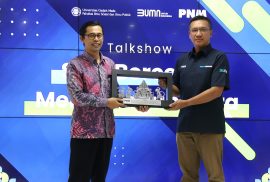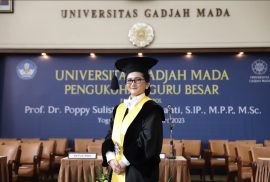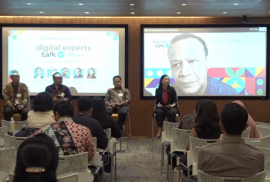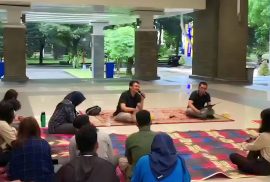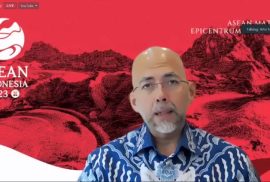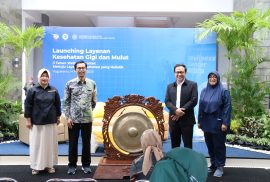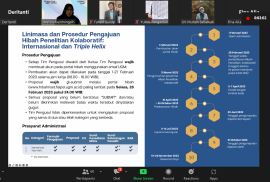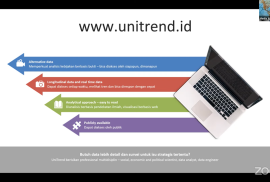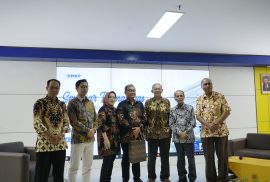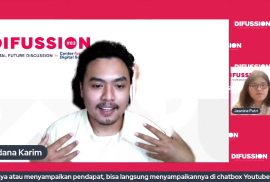Yogyakarta, February 26th 2023─The development of the digital world makes the flow of communication more complex. Not only because of its convenience, but the digital world has also provided major disruptions in terms of advertising or image branding. This phenomenon certainly requires the current generation to be able to understand how to manage a quality self-image in society. Permodalan Nasional Madani (PNM), a subsidiary of Bank Rakyat Indonesia (BRI) which is engaged in capital and micro business development, also has a social responsibility to take part in empowering people in the digital era. Through a talk show titled “The Art of Storytelling on Image Building”, PNM fulfills this role by targeting the younger generation.
News
Yogyakarta, February 23rd 2023─Prof. Dr. Poppy Sulistyaning Winanti was officially inaugurated as a Professor of International Relations on Thursday (23/02) at the Senate Hall, Universitas Gadjah Mada. This inauguration marked Poppy as the first female professor in the field of international relations at UGM. During her time as an academic, Poppy consistently pursued international political economy studies, including the politics of international cooperation, regional economic integration, and issues surrounding the reform of the World Trade Organization (WTO). In her inauguration speech, Poppy conveyed an idea entitled “Reconsidering ‘Embedded Liberalism’ for WTO Reform: Plurilateralism in International Trade Multilateralism”.
Yogyakarta, February 22nd 2023─Center for Digital Society (CfDS) of the Faculty of Social and Political Science Universitas Gadjah Mada (Fisipol UGM) is back with Digital Experts Talk #18 with the title “The Future of Hybrid Education in Post-Pandemic Indonesia”. The event, which was held in a hybrid manner in Google Indonesia’s office on Wednesday (22/2) was a collaboration between CfDS and Google for Education. There were four speakers in the show; I Nyoman Rudi Kurniawan the Director of Junior High School, Director General of Early Childhood Education, Ministry of Education and Culture; Bonifasius Wahyu Pudjianto, the Director of Informatics Empowerment Directorate General Aptika Kominfo; Topari, Informatics and Communication Technology Teacher at SMA 1 Playen; and Kuskridho Ambardi, CfDS Researcher.
Yogyakarta, February 17th 2023─To promote the dissemination of study results by the academic community of FISIPOL UGM, the Research, Publication, and Community Service Unit (UP3M) holds monthly discussions. On Friday (17/02), dozens of students from both inside and outside of UGM enlivened the discussion at West Tuesday, FISIPOL. The discussion was moderated by Tapiheru Joash Elisha S. and attended by the Dean of Fisipol, Wawan Mas’udi, Ph.D. This discussion series focuses on Muchtar Habibi’s study findings in the book Capitalism and Agrarian Change: Class, Production, and Reproduction. This book is the result of Muchtar’s dissertation while studying at the University of London.
Fisipol UGM Talked About Opportunities and Challenges to Welcome Indonesia’s 2023 ASEAN Chairmanship
Yogyakarta, February 14th 2023─The ASEAN Studies Center (ASC) of Gadjah Mada University’s Faculty of Social and Political Science held a public seminar titled “Indonesia’s Agenda in the 2023 ASEAN Chairmanship: Challenges and Opportunities” on Tuesday (14/2). The event was held online and divided into two discussion panels. The first session raised the topic of “Geopolitical Challenges and Democracy in the ASEAN Region” and was filled by Sidharto Suryodipuro, Director General for ASEAN Cooperation in the Ministry of Foreign Affairs, as well as Amalinda Savirani, a lecturer in Fisipol UGM.
Yogyakarta, February 14th 2023─Coinciding with three years of its inauguration, the Wellness Center of FISIPOL UGM in collaboration with the Faculty of Dentistry (FKG) UGM and the Academic Hospital (RSA) of UGM, held a health talk show for the UGM Fisipol academic community in the framework of the Launching of Dental and Oral Health Services (GILUT) on Tuesday morning (14/1), at the Posbindu Building of FISIPOL UGM.
The series of activities were opened with a dental and oral health check by the UGM FKG medical team, as well as a free basic health check by the UGM RSA medical team. Then, there were two talk show sessions, namely the theme “Dental Health and Work Productivity” hosted by drg. Suryono as the Dean of FKG UGM and the theme “Mental Health and Work Productivity” presented by dr. Tika Prasetiawati as a Mental Health Specialist at RSA UGM.
Yogyakarta, January 31st 2023─The Research, Publication and Community Service Unit (UP3M) of Gadjah Mada University has held an online socialization of “2023 UGM FISIPOL Research, Publication, and Community Service Grants” via Zoom Meeting (31/1). This activity was attended by UP3M representatives, Wahyu Kustiningsih, FISIPOL UGM lecturers, and undergraduate, postgraduate, and doctoral students of FISIPOL UGM. This socialization was carried out to provide an overview regarding the 2023 FISIPOL research grant.
Yogyakarta, January 30th 2023─The Institute for Policy Development (POLDEV) of the Faculty of Social and Political Science Gadjah Mada University (Fisipol UGM) created a website dashboard or the UniTrend platform which was launched on Tuesday (30/1). In the launching event, there was also a discussion titled “The Turbulence Towards Development in the Political Year” which was filled with many speakers such as Ignatius Ardhana Reswara, Project Manager UniTrend; Media Wahyudi Askar, Direktur POLDEV; Wahyudi Kumorotomo, as the Head of the MKP Public Policy DepartmentFadli Ramdhanil, the Program Manager of Perludem; Mirah Midadan Fahmid, INDEF Economist; and was moderated by Jefri Andika Pakpahan, Researcher of POLDEV.
Yogyakarta, January 26th 2023─With the end of duty of Prof. Dr. Muhadjir Muhammad Darwin, Department of Public Policy Management (DMKP) of Faculty of Social and Political Sciences, Gadjah Mada University (FISIPOL UGM) held a Retirement Seminar on Thursday (26/1) at the Auditorium Mandiri of FISIPOL UGM as well as online on Zoom. The seminar with the theme Contemporary Gender Issues: Challenges and Policy Responses also aims to appreciate Prof. Muhadjir for his contribution so far, both in the form of scientific development and dedication to the field of gender studies and public policy.
Yogyakarta, January 24th 2022─Issues related to Artificial Intelligence (AI) are increasingly prevalent in society. These various artificial intelligences are now being used because they are considered more effective and practical, and allow anyone to produce work easily. In response to this discourse, the Center for Digital Society (CfDS) of FISIPOL UGM held Difussion #83 discussion series entitled “Legality in the Digital Era: The Revealance of IP on Regulating AI-Generated Arts” on Tuesday (24/1).

